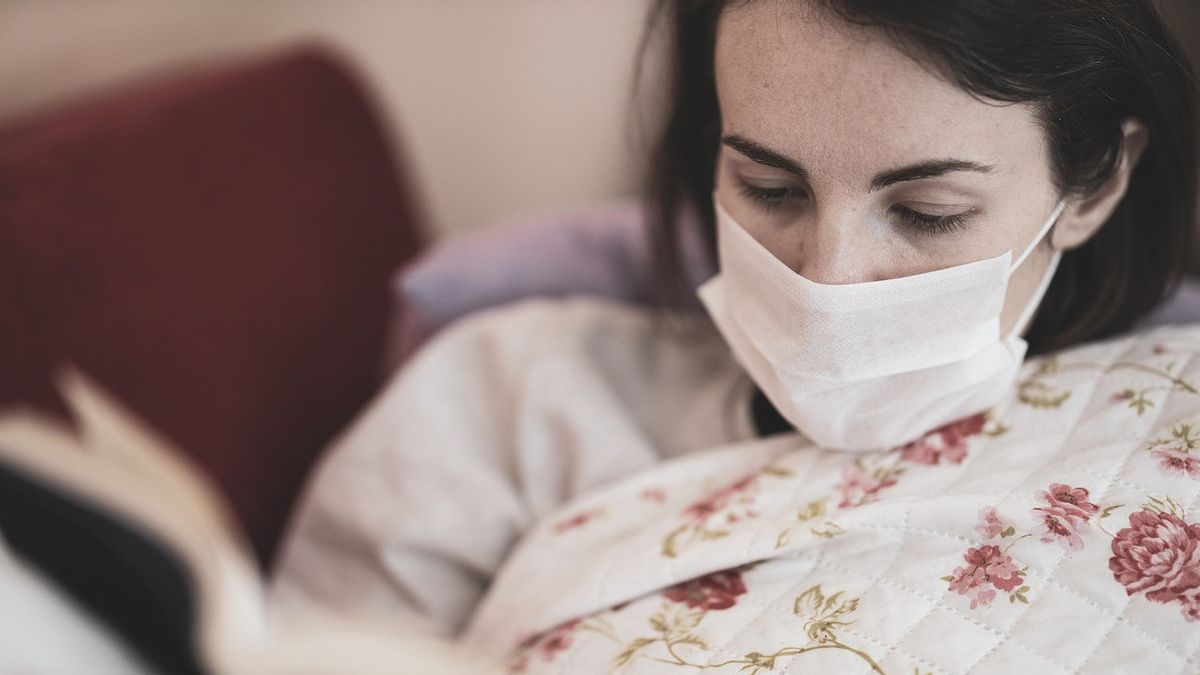JAKARTA - People who have been infected with COVID-19 will have a stronger resistance in dealing with the corona virus because the immune system has recognized the character of the virus. When re-exposed the body will be better prepared to deal with it. Yes, even though you have been infected with COVID-19 and declared cured, there is still the possibility of someone re-infecting the virus, a condition called COVID-19 reinfection.
"COVID-19 reinfection occurs when someone who has recovered from a corona virus infection is infected again by a different structure of the corona virus from the previous corona virus infection," explained Internal Medicine Specialist dr. Yoga Fitriakusumah, a member of the Indonesian Doctors Association, was reported by Antara, Tuesday.
Reinfection is different from repositivity or reactivation of the virus, a condition when the corona virus that is still left in the body infects the person again, or the infection is caused by a virus with the same structure.
There needs to be sampling to sequence the genetic information (genome) of the virus to be able to distinguish whether there is reinfection or repositive/reactivation. The sample comes from tests on the first and second positive cases. The researcher sorted the two samples and compared them to find out whether there were similarities in structure or variance. If different, it means that the patient has reinfection with COVID-19.
However, sequencing the viral genome is no light task. There must be trained personnel and equipment and laboratories with certain standards to do this. Sequencing the genome also takes a long time.
In Indonesia, there are no specific guidelines for dealing with reinfection and repositive cases.
Patients who are positive for COVID-19 for the second time are treated in the same way when they were first positive," said the Internal Medicine Specialist who practices at Primaya Evasari Hospital.
He added that a study at the Nuffield Department of Medicine at the University of Oxford, United States, found that many cases of reinfection with COVID-19 were likely to be positive. Because the corona virus can cause infection for a long time and its genome structure allows the virus to survive in the body. This virus can also go undetected in tests and ready to attack once again.
However, basically COVID-19 reinfection is rare. Based on research at Public Health England Colindale in the UK and the Statens Serum Institute in Denmark, people who have been infected with the corona virus get up to 80 percent protection from a second infection. As for research in Denmark, protection for elderly citizens (over 65 years) is only 47 percent. Thus, referring to the results of the study, the elderly are classified as more at risk for reinfection.
Analysis of the research shows that among people who tested positive in the first wave of COVID-19, 0.65 percent re-positive in the second wave of the outbreak. People who have comorbidities are also more likely to get a second infection.
He added, even though the body has developed an immune system to fight COVID-19, there is still the possibility that a person can be reinfected. Because COVID-19 can develop or mutate so that it has many variants with their respective characters. According to a number of studies, some variants are able to fight the human immune system.
"Therefore, people who have been infected with COVID-19 still have to apply health protocols. It's the same with people who have been vaccinated. Although vaccines provide protection against viral attacks, people who have been vaccinated can still be infected if exposed to the coronavirus that causes COVID-19."
Until now, various studies have not come to a conclusion whether the symptoms of reinfection must be more severe than before or not. Doctors at the Gulhane Training and Research Hospital in Turkey said there were patients who had no symptoms at first infection, but experienced mild symptoms during reinfection. Meanwhile, if the first infection must be hospitalized, the patient requires intensive care during reinfection, especially among the elderly who have comorbidities.
However, several other studies have found no difference in symptoms between the first and second infections. In fact, there are patients whose symptoms are milder when exposed to COVID-19 reinfection.
“One of the factors thought to have an effect is the immune system. If the immunity formed from the first infection is still strong and can fight the corona virus, then the symptoms will be mild or even no symptoms. Meanwhile, if the immune system is weak or cannot find the corona virus that attacks a person's body, then the symptoms can be more severe," he said.
The corona virus that causes COVID-19 is classified as a new type, so there is no research that can confirm how long antibodies can last, both antibodies that are naturally formed due to COVID-19 infection and those from vaccination.
From a number of cases of reinfection of COVID-19, conclusions cannot be drawn because the distance between the first and second infections reported varies. There are only two months negative turned out to be infected again. There is also reinfection that occurs after a year of recovery. Research is still ongoing to understand it further.
He said the immune system that was formed from the first infection would remember the character of the virus that attacked later on. However, there is a possibility that the antibody system will forget or not recognize when it encounters a virus with a different variant.
So, can someone be infected with COVID-19 if they have been vaccinated? He emphasized that vaccines are not a guarantee that people will not be infected with COVID-19, but rather a means of forming antibodies to provide protection against virus attacks. The process of antibody formation is not instantaneous, which is why most vaccines require up to twice the dose for maximum protection.
“Thus, people who have been vaccinated can still be infected with COVID-19. However, the risk of infection is less than for people who have not received antibodies from the vaccine. Even if infected, it is likely that the symptoms are only mild or without symptoms, so the risk of becoming seriously ill and needing to be hospitalized is smaller," he asserted.
The English, Chinese, Japanese, Arabic, and French versions are automatically generated by the AI. So there may still be inaccuracies in translating, please always see Indonesian as our main language. (system supported by DigitalSiber.id)









